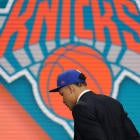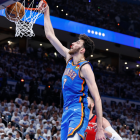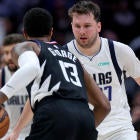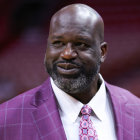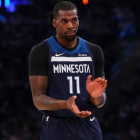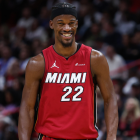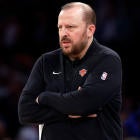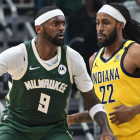The 2018 NBA Draft is in the books. The Phoenix Suns did what everyone expected, selecting DeAndre Ayton with the No. 1 overall pick, and the Sacramento Kings followed that up by taking Marvin Bagley III at No. 2 overall. But then things got a little wild. Atlanta threw a wrench into everything by swapping its third pick with the Mavericks in return for the fifth pick in a mid-draft trade that sent Luka Doncic to the Mavericks and Trae Young to the Hawks.
Young was the first of three first-round picks for the re-booting Atlanta franchise on Thursday. Maryland sharpshooter Kevin Huerter came off the board at 19 and Villanova product Omari Spellman was selected at 30. Together, they form a trio of young shooters that should help accelerate the rebuild alongside the youth already in place with John Collins and Taurean Prince. Their stroke of genius by adding a versatile shooter in Huerter, a do-it-all offensive weapon in Young and a stretch-the-floor big in Spellman makes them one of the big winners of draft night.
Winner: Suns
There's something to be said for not screwing up and taking the safe pick. That's what the Phoenix Suns did at No. 1 by selecting 7-foot-1 phenom Deandre Ayton. It was a decision that was seemingly made weeks ago, and they never wavered from it. But most importantly, didn't get cute by trying to turn the top pick into multiple assets via trade. Ayton was the best prospect and they made him their top pick. Simple.
The Suns also went safe with their 16th pick, too. They selected Texas Tech's Zhaire Smith and agreed to trade him to the Philadelphia 76ers in exchange for a more ready-made player in Mikal Bridges, who was the 10th pick in the draft. Then drafting French point guard Elie Okobo at 31 -- a player I had slotted as a late first-round pick -- was icing on top of the cake. Aces all around, Phoenix.
Loser: Knicks
Even Adam Silver seemingly couldn't believe the Knicks scooped up Kentucky product Kevin Knox with the No. 9 pick:
Was it just me or did Adam Silver sound surprised when he announced Kevin Knox? pic.twitter.com/NNSUc9jPqR
— Knicks Film School (@KnickFilmSchool) June 22, 2018
I think Knox has a chance to be a great player down the line, though I'd liked to have seen them pursue a point guard. But the bigger beef I have with New York's draft is with their decision to select 7-foot center Mitchell Robinson at 36. Robinson fits the mold of a prospect being a year away from being a year away, at the earliest. A total gamble. Didn't even play ball last season. So taking him at 36 is questionable given his lack of experience, and even more so considering glaring needs elsewhere on the roster.
Winner: Mavericks
How about the guts from Mavs brass? They moved from No. 5 to No. 3 to get their man in Slovenian star Luka Doncic, all without having to take back any unwanted salary from the Hawks in the swap that sent Trae Young to Atlanta. The Mavericks have been rumored to try and make a push back to the playoffs next season, and in getting Doncic they have an immediate impact guy who can assist in that effort, and also double as a franchise cornerstone in a post-Dirk world -- whenever that dark day in Dallas eventually comes. Adding veteran college players Jalen Brunson and Ray Spalding should also help with establishing depth for a run at the playoffs next season.
Loser: 76ers
The Sixers made the safe -- and by my estimation, correct pick -- by selecting Mikal Bridges at No. 10 overall. Then they struck a deal with the Suns to trade him for Zhaire Smith, a lesser-polished 3-and-D prospect who is much further away from contributing immediately than Bridges was. Sure, they save money in cap space by moving the 10th pick for the 16th. And the future first-rounder is a decent return. But Bridges' value as a day-one contributor was worth the extra penny in cap space.
Even more head-scratching: Philly took Landry Shamet with its 26th pick -- yes, yes, I know, another point guard. So now it raises the question: What does this mean for Markelle Fultz's future as a Sixer? We have more questions than answers about this team coming out of the draft. That's not a good sign for a team that expects to be a big player in the free agent market this summer.
Loser: Michael Porter Jr.
Who would have thought that Missouri product Michael Porter Jr. would see his stock nearly fall out of the lottery? There were rumblings the Kings liked him at 2, which turned out to be a ruse. But his fall from potential top-5 pick to No. 14 pick is still no less stunning.
Good on the Nuggets for preventing him from free-falling and taking a chance on him, but the fall is a stinger for Porter Jr., who could've earned a salary of more than $7.3 million annually had he been Sacramento's guy at 2. Instead, at 14, he's in a draft slot where he'll likely earn just shy of $3 million on salary. That's tough to swallow -- even if his free fall was likely the result of a back injury that limited him to three games in college.
Winner: Hawks
We won't be able to truly declare whether the Hawks or the Mavericks won Thursday night's trade, but for now it's safe to say both come out winners. Instead of sticking with Luka Doncic at 3, the Hawks flipped him for Trae Young -- the player they had their eyes on all along. Young had a phenomenal workout with the team recently, according to CBS Sports' Matt Norlander. And as a sweetener to the deal, Atlanta also picked up a 2019 first-round pick from the Mavericks that will convey to them next June as long as it falls outside the top five, according to the New York Times' Marc Stein.
Loser: Wizards
I love the pick they made in Troy Brown. I just would have loved it if they made it, say, 10 picks later. Exacerbating things, they passed up on the uber-athletic Zhaire Smith, sharpshooter Donte DiVincenzo, and combo guard Lonnie Walker IV -- all players who could realistically make an immediate impact in Washington's backcourt. Brown's upside is as a potential glue guy with good offensive instincts from the wing position, but he's not likely to develop into the do-it-all scorer they could have snagged at 15. Even their own GM isn't sure Brown will crack the Wizards' rotation next season. And that goes double for their pick made at 44 in Issuf Sanon, a Ukrainian product who plays point guard.
Winner: Lonnie Walker IV
Lonnie Walker IV is a lottery talent, plain and simple. So leave it to the Spurs -- one of the best franchises at identifying and developing talent -- to get a steal by selecting him at 18 after he fell a few spots. At 6-foot-4, Walker IV fills a need for San Antonio as a perimeter scorer who can create his own shot. And he could be in line to pick up big minutes if Kawhi Leonard is dealt this offseason. Plus, his hair.
Loser: Toronto Raptors
For as much that was made about Toronto potentially looking to bolster its roster or hitting a mini-reset button to shake things up after being swept by the Cavs in the playoffs, the Raptors were a non-factor on draft night. And by non-factor, I mean they made zero moves to move into the draft, kept their current roster intact, and now enter free agency in the same situation they found themselves after Cleveland ran them off the floor in the second round.
Winner: Oklahoma City Thunder
The Thunder wielded their two second-round picks well, selecting Virginia 3-and-D prospect Devon Hall at 53 and UT-Arlington product Kevin Hervey, a do-it-all scorer, at 57. Both solid picks. But the big win was their post-draft acquisition of Kentucky athlete Hamidou Diallo, according to ESPN. Diallo was selected 45th by Charlotte, and brings an athleticism and defensive presence to the Thunder that gives them an insurance policy for Andre Roberson moving forward.
Loser: Arizona guards
The University of Arizona was well-represented by Deandre Ayton, who was drafted first overall by the Suns. But his former teammates and fellow early entrants, Rawle Alkins and Allonzo Trier, weren't as fortunate. Alkins and Trier fell completely out of the draft, the former being the most surprising; Alkins had received some buzz as a potential first-round talent.













